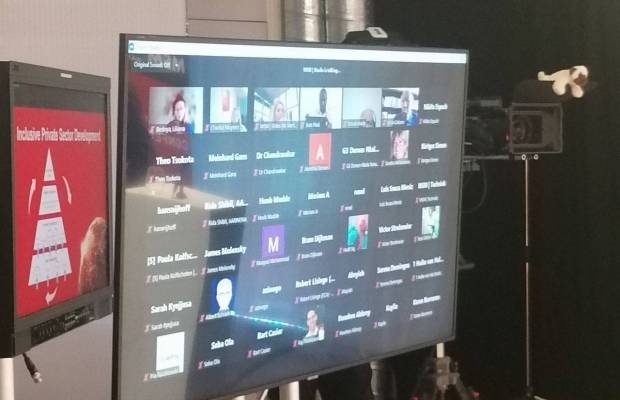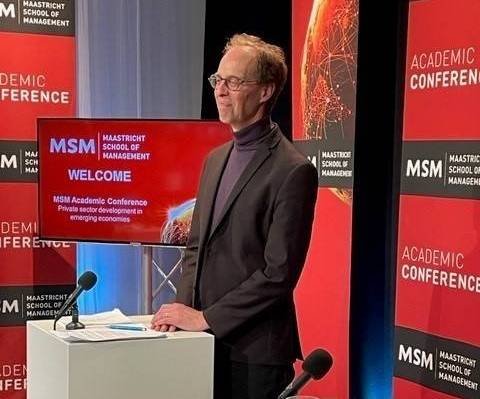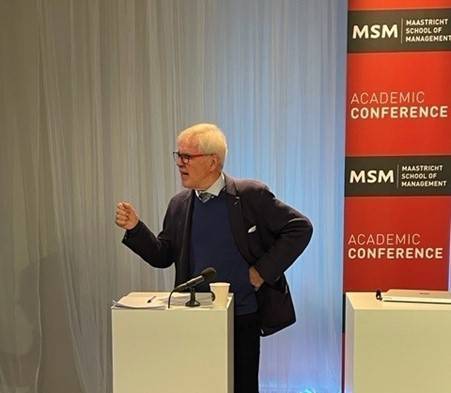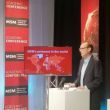MSM Academic Conference: Sharing knowledge and best practices on private sector development
On 1 December, Maastricht School of Management (MSM) organized a successful Academic Conference themed “Private sector development in emerging economies, contributing to a climate smart and inclusive society”. Virtually we welcomed over 100 people from 30+ countries who joined 3 keynote speeches and 30 paper presentations. The conference was the first in a series of events marking MSM’s 70 years contribution to global management.
The day started with a warm welcome from MSM’s Director of the Expert Centre for Emerging Economies, Dr. Diederik de Boer. In his opening speech, Dr. de Boer introduced the participants to MSM’s rich history of 70 years of management education and management development. Based on this wide array of experience, the conference the conference provided the opportunity of introducing the revamping of the management development pillar into MSM’s Expert Centre for Emerging Economies. The centre will focus on management development in emerging economies zooming in on practical, academic and policy issues. This often occurs in the realm of private sector development within the expertise areas of industrial policy and innovation, value chain development, entrepreneurship, leadership and sustainable business development. “Having a broad range of projects and programs in these fields, running in more than 50 countries around the world, and building on this expertise of the past and the present, we believe that this Academic Conference will provide a lot of insights for its participants”, Dr. de Boer stated.
Industrial policy and parallel sessions
The welcome speech was followed by the first keynote speech, being delivered by renowned economist and author, Professor Ha-Joon Chang. As MSM we were proud to have Professor Chang sharing his valuable insights on Industrial policy and best practices for Emerging Economies. Within his keynote, Professor Chang highlighted the set of policies that aim to influence the evolution of particular industrial sectors. Furthermore, he discussed several best practices with one being that the debates on industrial policy of the last half a century have taught us what makes effective industrial policy, namely, policy design, political economy and implementation capabilities.
After this insightful keynote the participants could join the first paper presentations in the break-out rooms. The first session covered the topics of: 1) Triple helix constructs for local development and industrial development, 2) Inclusive development (focus on gender and youth) and 3) Climate smart agriculture & water efficiency and ecosystem development. Academics from all corners of the world presented their papers on the research they conducted in the area of private sector development linking to the previously mentioned topics. Each presentation took roughly 10 minutes, followed by a Q&A session.
The morning session was full of knowledge sharing and positive discussion and we were happy to welcome back so many participants after the lunch break. As it was a full day program that was being delivered fully online, it was fantastic to see so many people still interested, engaged and hungry for more knowledge.
The afternoon session kicked off with the book presentation of MSM Prof. Dr. Harald Sander’s new book titled “Understanding the New Global Economy – A European Perspective”. In his book presentation Prof. Dr. Sander discussed globalization and its changing character linked to the new emerging global economy. The book presentation was followed by the next keynote by Dr. Kwan S. Kim, Emeritus Professor at Kellog Institute for International Studies. Dr. Kim is well known at MSM as he has lectured at MSM in the past. In his keynote, Dr. Kim focused on how Industrial Policy has transformed South Korea.


Value chains, CSA and sustainable finance
After an interesting keynote of Dr. Kwan, the break-out rooms were opened again for the participants to join the next paper presentation sessions on the topics of: 1) Value chain development for countries in transition, 2) Climate smart agriculture & water efficiency and ecosystem development and 3) Enabling impact and sustainable finance.
Each break-out room was facilitated by an MSM expert on the topic to guide the discussion and make comments were needed. In each session, five academics presented their research paper to the audience and answered questions afterwards. The topics sparked lively discussions where best practices were shared.
Coming to almost the end of a successful first virtual Academic Conference, the final keynote was provided by Professor Henry Etzkowitz, founder of the Triple Helix model. The triple helix approach implies the collaboration between academia, government and the industry to strengthen local economic development. With this concept widely used in MSM’s institutional collaboration projects, it was valuable to have the founder of the model shining his light on the importance of the triple helix approach and sharing his expertise with the participants. The closing of the conference was provided by Prof. Meine Pieter van Dijk, who was in charge of the content of the conference. Prof. van Dijk concluded the conference with uplifting words on the importance of doing research, the dissemination of findings and sharing knowledge.
The closing of the conference was provided by Prof. Meine Pieter van Dijk, who was in charge of the content of the conference. Prof. van Dijk concluded the conference with uplifting words on the importance of doing research, the dissemination of findings and sharing knowledge.
We would like to thank all the participants, keynote speakers and paper presenters who joined the Academic Conference on Private Sector Development and contributed to its success.
Mark your calendar for upcoming MSM conferences
In the light of MSM’s 70 years of contributing to global management, MSM will organize its first Global Network Conference on 24 March 2022. Check the website for updates on this conference.
On 25 November 2022 MSM will organize a conference on Collaborative Networks for Sustainability.
We hope to see you again in these or other future MSM conferences.

